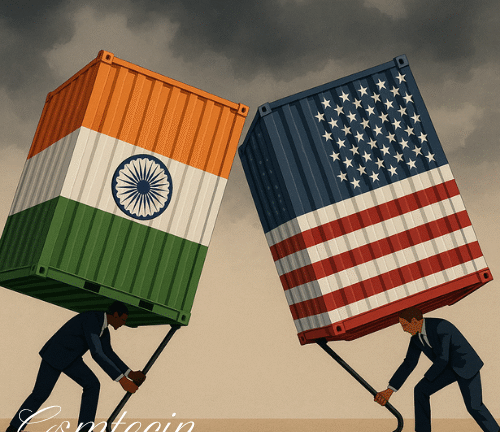India has formally informed the World Trade Organisation (WTO) of its intention to halt trade concessions in retaliation for U.S. auto tariffs implemented under previous President Donald Trump. This action comes after the United States imposed a 25% duty on Indian imports of light trucks, passenger cars, and some auto parts on March 26, 2025.
According to the Indian government, these U.S. activities are against WTO regulations, including the WTO Safeguards Agreement and the General Agreement on Tariffs and Trade (GATT) 1994. India contends that the United States created a risky precedent and violated international trade standards by using national security under Section 232 of the Trade Expansion Act as a pretext for protectionist policies.
Additional duties on a few U.S. items, potentially amounting to $235 million yearly, are part of India’s proposed reaction. These include things like industrial equipment, apples, almonds, and powerful motorcycles—items that are carefully chosen to affect U.S. exports and exert pressure on Washington.
The WTO’s Council for Trade in Goods received a formal notification of the retaliatory action. Given that the United States turned down India’s numerous requests for consultations, it states that India “reserves the right to suspend concessions or other obligations.” Furthermore, India has the authority to update its pricing and product list in subsequent announcements.
India and the United States have already clashed over Section 232 tariffs. India’s counter-tariffs and WTO proceedings were also the outcome of earlier conflicts over steel and aluminium tariffs imposed in 2018. However, because the United States prevents appointments, the WTO’s Appellate Body is still inoperable, which reduces the efficacy of formal dispute resolution.
Despite a change in approach from protectionism to multilateral collaboration, the Biden administration has kept many of the tariffs from the Trump administration. Therefore, India’s action is a protest against ongoing trade restrictions by the United States as well as a request to restore the legitimacy of the WTO dispute mechanism.
Since the European Union, Canada, China, and others have all contested the United States’ use of national security as an excuse for tariffs, India’s position is likewise in line with sentiment throughout the world. Critics contend that this leads to arbitrary trade conflicts and erodes the rules-based system of global trade.
The United States and India are still negotiating trade. India looks for deals that benefit both parties and safeguard national interests, as Commerce Minister Piyush Goyal has underlined. President Trump’s July 9 reciprocal tariff deadline prompted talks on a trade agreement, but India maintains it won’t jump into a deal before making sure it fits with long-term national interests.
To sum up, India’s WTO notification represents a calculated and symbolic protest against the United States’ unilateral tariffs. It reaffirms India’s commitment to multilateralism and fair trade practices while highlighting the pressing need to reform the WTO and resurrect its dispute resolution mechanism.




